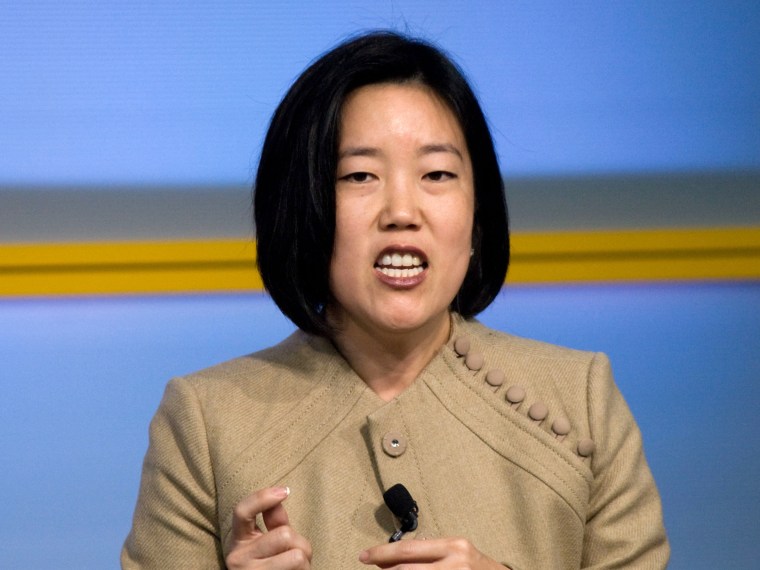StudentsFirst, a school reform lobbying organization headed by education reformer Michelle Rhee, recently released the results of its own national study of education policies by state. According to the results, no state received an A, but plenty scored just barely average, and 11 states received an F.
Each grade is the determined based on three areas: whether a state's policies elevate teaching, empower parents, spend wisely, and govern well. The report highlights states that provide abundant school choices for parents (i.e. charter schools) and blasts states that fail to evaluate teachers and principals in "meaningful ways."
The two highest-ranked states, according to StudentsFirst, are Florida and Louisiana—two states whose schools have gained national attention, but not in a positive light. The Florida Comprehensive Assessment Test, set up by former Gov. Jeb Bush, is scandal-ridden, and Louisiana Gov. Bobby Jindal's voucher program to send students to private schools that deny basic scientific facts was recently ruled unconstitutional by a state judge.
But a key area that StudentsFirst leaves out of its grading system also happens to be one of Rhee's most talked-about issues: student test scores. Maryland, which ranked the highest in Education Week's 2012 state report card in terms of achievement and standards, only received a D+ from Rhee.
As the Washington Post points out:
One of the measures that was not used was standardized test scores — which is ironic given that she is a big supporter of test-driven accountability for students, teachers and principals. This allowed StudentsFirst to give bad grades to states with high standardized test scores, such as Massachusetts. The reason? StudentsFirst says that while the state is consistently ranked first in National Assessment of Educational Progress scores for 4th grade and 8th grade reading and math, there was a large gap in scores in 2011 between white and Hispanic students.Louisiana consistently ranks at or near the bottom of states for NAEP scores, and the achievement gap in Louisiana is huge: State tests show a 22.1 point gap for black and white students in English Language Arts in spring 2011 and a 26.7 point gap in math. But the state is implementing reforms that Rhee likes.
A new Frontline documentary that premiered Tuesday night delved into Rhee's legacy, and examined the reasons she became the most celebrated and most reviled figure in education reform. According to The Education of Michelle Rhee, Rhee made a national name for herself in the three years she served as the first chancellor of D.C. Public Schools. In 2007, Rhee took then-Mayor Adrian Fenty's offer to serve as chancellor, despite having no experience running a school system. Rhee took the job under the condition she would receive mayoral backing for any changes she wanted to make.
One of the biggest shifts was Rhee's success in changing the rules of tenure: Rhee lobbied the D.C. City Council to allow principals and teachers to be terminated at any time. In her first year, Rhee closed 23 schools, fired 36 principals, and cut about 121 jobs (roughly 15%) from the central office staff.
Rhee focused her efforts in her first year on increasing test scores. The following year, she used poor student scores to target teachers she felt were ineffective at raising performance. Former Washington Teachers' Union president George Parker told Frontline that Rhee's policies "created a culture of low morale."
As schools and school leaders competed to keep their schools and jobs safe, allegations of cheating arose: high erasure marks were recorded in D.C. schools that produced the highest test scores. More suspicion arose after Rhee left her chancellor position and schools tightened security around test booklets. The results that year after Rhee left showed a significant decrease in test scores in schools that had done well under her leadership.
While federal investigators found no evidence of cheating—despite eyewitness accounts—the idea of teachers changing test answers to produce higher scores is not unheard of. A 2011 investigation in Georgia revealed widespread cheating on standardized tests in Atlanta public schools. As Slate pointed out after the Atlanta cheating scandal was revealed, the problem was the federal policy educators felt pressured to respond to:
The problem with this impulse to forgive No Child Left Behind and defend high-stakes testing is that the Atlanta case isn't an isolated tragedy. A growing spate of evidence from around the country suggests that the most egregious practices in Atlanta—teachers purposefully seating struggling kids next to high-performing ones to encourage cheating on tests; educators gathering at after-school "erasure parties" to correct multiple-choice answer sheets—are part of a national, and indeed a historic trend, one that is bolstered by No Child Left Behind's emphasis on pressuring educators to produce spectacular test results.
Rhee's standards have tied student performance almost exclusively to teacher performance, and as a result has unfairly targeted teachers whose students could not perform well on standardized tests. Unfortunately, what Rhee has left out of her sweeping policy reforms is the fact that a child is not two-dimensional and doing well on a test has little to do with a child's intelligence or ability to perform well later in life.
While it's believable that states across the country are struggling to close its schools' achievement gaps, the criteria StudentsFirst used to grade each state seems to be part of Rhee's personal agenda to reform schools nationwide using the standards she believed had a great impact during her time as D.C.'s chancellor.
Watch the Frontline documentary on Rhee in full below.
Watch The Education of Michelle Rhee on PBS. See more from FRONTLINE.
